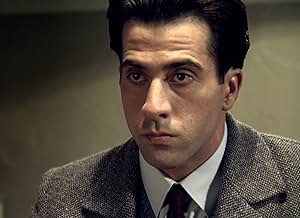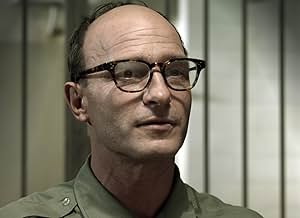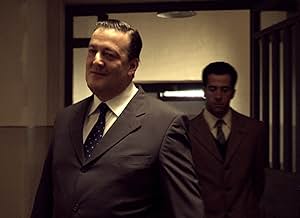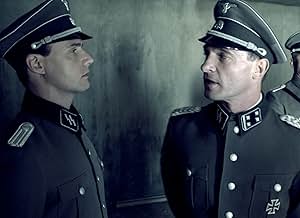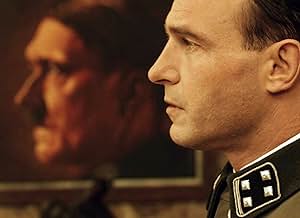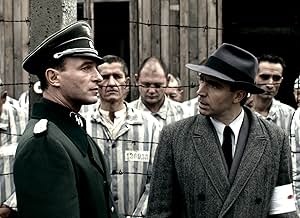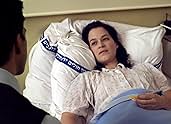VALUTAZIONE IMDb
5,9/10
3658
LA TUA VALUTAZIONE
La vita di Adolf Eichmann, uno dei più importanti gerarchi nazisti, ricostruita attraverso la confessione fatta prima di essere giustiziato in Israele.La vita di Adolf Eichmann, uno dei più importanti gerarchi nazisti, ricostruita attraverso la confessione fatta prima di essere giustiziato in Israele.La vita di Adolf Eichmann, uno dei più importanti gerarchi nazisti, ricostruita attraverso la confessione fatta prima di essere giustiziato in Israele.
- Regia
- Sceneggiatura
- Star
Avner W. Less
- Self
- (filmato d'archivio)
- (voce)
Tereza Srbova
- Baroness Ingrid von Ihama
- (as Tereza Srbová)
Tilly O'Neil
- Hannah
- (as Tilly Golding)
Recensioni in evidenza
Renowned war criminal Adolf Eichmann has been found at large in Argentina by Israeli agents, where he is promptly kidnapped and brought to Israel for trial. Avner Less is appointed as his interrogator before the trial. The Israeli nation is baying for his blood outside, which makes Less's task of being impartial all the harder. The film revolves around their interviews, Eichmann's replies to certain questions about his past atrocities bringing us back through flashback to the war. Eichmann naturally denies the offences and puts most down to obeying orders. The cat and mouse of the interviewing process and its gradual progression is very interesting and well crafted. Thomas Kretschmann's performance in particular as Eichmann is excellent and the film belongs to him.
EICHMANN is not an easy film to view: revisiting the atrocities of the Nazi Third Reich through the greasy, smooth, denying words of Adolf Eichmann is a nightmare, but a nightmare we must revisit periodically to remind us of just how heinous was that period of history. The film is set in 160 - 1962 and is based on transcripts obtained by the Israeli forces from the files of the concentration camps and Nazi regime, transcripts that document the words of Adolf Eichmann that lead to his final confession of his participation in the Third Reich atrocities as unveiled under the slow and insidious interview by Police Captain Avner Less.
The film opens after the 1960 capture of Eichmann from his home in Argentina, the country where he and his wife and four sons had been in hiding since the end of WW II. Adolf Eichmann (brilliantly portrayed by Thomas Kretschmann) had been the World's Most Wanted Man and his transport to Israel was met by jeering crowds. The Israeli Minister Tormer (Stephen Fry) elects police captain Avner Less (Troy Garity) to conduct the interview in what is supposed to be a top-secret assignment. But the news escapes and Avner's wife Vera (Franka Potente), suffering from polio of the spine, and the Avner children are marked as targets by the Israeli's who do not appreciate the duty of Avner Less's obligation to interrogate and gain a complete confession from Eichmann before he can be tried. The months that the interrogations take prove that the Israeli's believed in justice: the facts must be proved completely before the prisoner is tried for atrocities.
During the interrogation months Eichmann is shown in flashbacks to have been not only following the orders of Hitler, but being committed to the purification of the 'Aryan race'. What screenwriter Snoo Wilson and director Robert Young allow is for us to see the human weakness of Eichmann as portrayed By Kretschmann: he had mistresses, including one Austrian Jewess and a Hungarian Countess who urged him to complete the Final Solution, he coldly signed extermination orders 'because he had to follow Hitler's orders', yet he also was an apparently devoted father to his own sons. Equal time is given to allow the audience to see the interaction between the conflicted parties of the interrogation: Avner was convinced he must prove beyond a shadow of a doubt that the prisoner was indeed guilty of all of the crimes fro which he was accused. The interrogations become a battle of wills between the smarmy, oily, manipulative Eichmann and the personally distraught Avner. At the close of the film the real Avner E. Less provides voice over regarding the hanging of Eichmann along with statistics of the Nazi atrocities that no matter how often they are quoted continue to astonish our ability to comprehend.
The only artistic aspect of the film that is ultimately distracting is the director's choice to have cinematographer Michael Conner use near black and white/sepia toning for the film. Certain scenes break into real color but the tone of the film footage seems dirty - and perhaps that is the reason for the choice. Richard Harvey adds the musical score, and there are some very fine cameo roles by Delaine Yates, Tereza Srbova, and Judit Viktor. But in the end it is the performance by Thomas Kretschmann that is terrifyingly real: he deserves awards for his courage to accept this role and for his unforgettable impersonation of a man so evil that under other actor's skills would be simply unbelievable. It is Kretschmann's extraordinary performance that brings home the terror of his film.
Grady Harp
The film opens after the 1960 capture of Eichmann from his home in Argentina, the country where he and his wife and four sons had been in hiding since the end of WW II. Adolf Eichmann (brilliantly portrayed by Thomas Kretschmann) had been the World's Most Wanted Man and his transport to Israel was met by jeering crowds. The Israeli Minister Tormer (Stephen Fry) elects police captain Avner Less (Troy Garity) to conduct the interview in what is supposed to be a top-secret assignment. But the news escapes and Avner's wife Vera (Franka Potente), suffering from polio of the spine, and the Avner children are marked as targets by the Israeli's who do not appreciate the duty of Avner Less's obligation to interrogate and gain a complete confession from Eichmann before he can be tried. The months that the interrogations take prove that the Israeli's believed in justice: the facts must be proved completely before the prisoner is tried for atrocities.
During the interrogation months Eichmann is shown in flashbacks to have been not only following the orders of Hitler, but being committed to the purification of the 'Aryan race'. What screenwriter Snoo Wilson and director Robert Young allow is for us to see the human weakness of Eichmann as portrayed By Kretschmann: he had mistresses, including one Austrian Jewess and a Hungarian Countess who urged him to complete the Final Solution, he coldly signed extermination orders 'because he had to follow Hitler's orders', yet he also was an apparently devoted father to his own sons. Equal time is given to allow the audience to see the interaction between the conflicted parties of the interrogation: Avner was convinced he must prove beyond a shadow of a doubt that the prisoner was indeed guilty of all of the crimes fro which he was accused. The interrogations become a battle of wills between the smarmy, oily, manipulative Eichmann and the personally distraught Avner. At the close of the film the real Avner E. Less provides voice over regarding the hanging of Eichmann along with statistics of the Nazi atrocities that no matter how often they are quoted continue to astonish our ability to comprehend.
The only artistic aspect of the film that is ultimately distracting is the director's choice to have cinematographer Michael Conner use near black and white/sepia toning for the film. Certain scenes break into real color but the tone of the film footage seems dirty - and perhaps that is the reason for the choice. Richard Harvey adds the musical score, and there are some very fine cameo roles by Delaine Yates, Tereza Srbova, and Judit Viktor. But in the end it is the performance by Thomas Kretschmann that is terrifyingly real: he deserves awards for his courage to accept this role and for his unforgettable impersonation of a man so evil that under other actor's skills would be simply unbelievable. It is Kretschmann's extraordinary performance that brings home the terror of his film.
Grady Harp
This version of EICHMANN (as a biography, biographical, or as any of the several excellent documentaries about his trails) apparently has a dream cast and technical crew to make the "definite" EICHMANN "fictionalized" film. Was Thomas Kretschmann born to play the perfect Nazi of our nightmares and dreams, or what?
Well, here his "Naziness",in total contrast to his brief but impactive appearance in Polanski's THE PIANIST, and in DER UNTERGANG (as Hitler's brother-in-law)is a waste. It's a waste because the script of the film is horrible. His stereotype Nazi features would have been better spent in the USA 1960's sitcom HOGAN'S HEROES.
I live in Brazil and have spent a good part of my life here, in Argentina and in Germany, though I'm American and grew up in the 60s when WWII was still as fresh as the collapse of the USSR is now. So, any well-rounded movie fan from this area (or news junkie) would have as a compulsory experience, followed on radio and TV (no cable back then) the before & post-war antics of these Eichamnns, Klaus Barbies and their cohorts.
Now, I sat through a 5 or 6 hour film in Berlin in 1998 or 1999 (or was it two 4 hour sittings)of the COMPLETE Eichmann trial in Israel. The documentary was a "big release" as Documentaries go. It was playing in several art cinemas in Berlin, one near the Memorial Church, another in Kreuzberg,and in the Oranienburgerstrasse "art film multiplex" where I saw it.
If anyone knows which film I'm talking about, please submit as anew title or e-mail me. It is not any of the options this site gives: (Displaying 8 Results) 1.The Man Who Captured Eichmann (1996) (TV) 2."Adolf Eichmann 2003) (TV) aka I Met Adolf Eichmann" - UK 3."L'Hidato Shel Adolf Eichmann" (1994) 4.Operation Eichmann (1961) 5. Eichmann Trial (1961) (TV) 6. "Eichmann and the Third Reich" (1961) 7. The Trial of Adolf Eichmann(1997) (TV) 8. Witnesses to the Holocaust-the Trial of Adolf Eichmann(1987)(TV).
I thought it was Number 7 (the 1997 TV version), but it's too short and has a moderator, which the long film I saw lacked). Anyway, with that film as DEFINITE, REAL and irrefutable genuine human emotion, tragedies, and wrecked lives revealed, WHY make a feature film?
Well, as the list of seven above show, there was no shortage of "Eichmann films" when this film was shot, and released. And it has been released. In the Rio Festival, EICHMANN had 4 screenings in the main large cinemas, and was held over for a third week of "Last Chance For the Best of Rio" which ended last week. And the copy had burned subtitles in French, with electronic Portuguese subtitles below the screen. So, it has been somewhat shown around the world.
As this looks like a probable straight to DVD release. I had never even read about the filming of this feature, which also (mis) casted the German (but dark and with a star power name) Franka Potente as the Israeli's prosecutor's wife in one of the boring and pointless subplots. Potente, like everyone else including Eichmann, only spoke English, though she and her Prosecutor husband had met in France, and supposedly spoke French with each other.
But not a word of German, Yiddish, French or Hebrew is heard.
FINE. English is the international language. But this being a criminal court case movie, with loads of depositions, at least one of the victims could have spoken in the 4 major languages related to the case. Just for effect, like Arien Brody's attempts at German in the PIANIST, for some authenticity, with English, though not one of the four languages related to the case, as the main language, but not as-the language spoken 100% of the time!
Anyway, there is a "real film" with authentic testimony from the actual victims in their mother tongues, plus a couple of hours in Austrian-accented German deposition Eichmann gave. That documentary was basically in Hebrew, but both sides staunchly used their national identity languages. Eichmann spoke only German, and the Israeli prosecutor, judges, and victims did too - but chose to ask in Hebrew (so the crowd could understand apparently). Thus the translations to French, English, Russian & Yiddish, which I'm counting here as German added to an already long documentary, in black & white, with no visual power film of it all, two sets of subtitles running all the time. It was difficult to watch, but authentic, and a real treasure, something this EICHMANN is not.
Again, the hours of the real trial is what you should look for. The Israeli Prosecutor was not a gorgeous and elegant leading man, nor was Eichmann nearly as attractive and "Nazi-like" (as defined by the Hollywood stereotype).
This film gives NO new insight on Eichmann. The screenplay is shamefully bad, and the scenery is SO not-Israel. It screams MALTA (where it was shot),though NO southern Mediterranean island would have given us something that looks like Tel Aviv. These islands are ancient, and Tel Aviv started to become a city in the late 1920s and 30s (not in the 15th century).
My suggestion: if you are die-hard Thomas Kretschmann and Franka Potente fans, go. But just to see them. You won't find any substance or anything new in this movie - such a terrible waste of time, money, story, and great (and beautiful) German actors!
Well, here his "Naziness",in total contrast to his brief but impactive appearance in Polanski's THE PIANIST, and in DER UNTERGANG (as Hitler's brother-in-law)is a waste. It's a waste because the script of the film is horrible. His stereotype Nazi features would have been better spent in the USA 1960's sitcom HOGAN'S HEROES.
I live in Brazil and have spent a good part of my life here, in Argentina and in Germany, though I'm American and grew up in the 60s when WWII was still as fresh as the collapse of the USSR is now. So, any well-rounded movie fan from this area (or news junkie) would have as a compulsory experience, followed on radio and TV (no cable back then) the before & post-war antics of these Eichamnns, Klaus Barbies and their cohorts.
Now, I sat through a 5 or 6 hour film in Berlin in 1998 or 1999 (or was it two 4 hour sittings)of the COMPLETE Eichmann trial in Israel. The documentary was a "big release" as Documentaries go. It was playing in several art cinemas in Berlin, one near the Memorial Church, another in Kreuzberg,and in the Oranienburgerstrasse "art film multiplex" where I saw it.
If anyone knows which film I'm talking about, please submit as anew title or e-mail me. It is not any of the options this site gives: (Displaying 8 Results) 1.The Man Who Captured Eichmann (1996) (TV) 2."Adolf Eichmann 2003) (TV) aka I Met Adolf Eichmann" - UK 3."L'Hidato Shel Adolf Eichmann" (1994) 4.Operation Eichmann (1961) 5. Eichmann Trial (1961) (TV) 6. "Eichmann and the Third Reich" (1961) 7. The Trial of Adolf Eichmann(1997) (TV) 8. Witnesses to the Holocaust-the Trial of Adolf Eichmann(1987)(TV).
I thought it was Number 7 (the 1997 TV version), but it's too short and has a moderator, which the long film I saw lacked). Anyway, with that film as DEFINITE, REAL and irrefutable genuine human emotion, tragedies, and wrecked lives revealed, WHY make a feature film?
Well, as the list of seven above show, there was no shortage of "Eichmann films" when this film was shot, and released. And it has been released. In the Rio Festival, EICHMANN had 4 screenings in the main large cinemas, and was held over for a third week of "Last Chance For the Best of Rio" which ended last week. And the copy had burned subtitles in French, with electronic Portuguese subtitles below the screen. So, it has been somewhat shown around the world.
As this looks like a probable straight to DVD release. I had never even read about the filming of this feature, which also (mis) casted the German (but dark and with a star power name) Franka Potente as the Israeli's prosecutor's wife in one of the boring and pointless subplots. Potente, like everyone else including Eichmann, only spoke English, though she and her Prosecutor husband had met in France, and supposedly spoke French with each other.
But not a word of German, Yiddish, French or Hebrew is heard.
FINE. English is the international language. But this being a criminal court case movie, with loads of depositions, at least one of the victims could have spoken in the 4 major languages related to the case. Just for effect, like Arien Brody's attempts at German in the PIANIST, for some authenticity, with English, though not one of the four languages related to the case, as the main language, but not as-the language spoken 100% of the time!
Anyway, there is a "real film" with authentic testimony from the actual victims in their mother tongues, plus a couple of hours in Austrian-accented German deposition Eichmann gave. That documentary was basically in Hebrew, but both sides staunchly used their national identity languages. Eichmann spoke only German, and the Israeli prosecutor, judges, and victims did too - but chose to ask in Hebrew (so the crowd could understand apparently). Thus the translations to French, English, Russian & Yiddish, which I'm counting here as German added to an already long documentary, in black & white, with no visual power film of it all, two sets of subtitles running all the time. It was difficult to watch, but authentic, and a real treasure, something this EICHMANN is not.
Again, the hours of the real trial is what you should look for. The Israeli Prosecutor was not a gorgeous and elegant leading man, nor was Eichmann nearly as attractive and "Nazi-like" (as defined by the Hollywood stereotype).
This film gives NO new insight on Eichmann. The screenplay is shamefully bad, and the scenery is SO not-Israel. It screams MALTA (where it was shot),though NO southern Mediterranean island would have given us something that looks like Tel Aviv. These islands are ancient, and Tel Aviv started to become a city in the late 1920s and 30s (not in the 15th century).
My suggestion: if you are die-hard Thomas Kretschmann and Franka Potente fans, go. But just to see them. You won't find any substance or anything new in this movie - such a terrible waste of time, money, story, and great (and beautiful) German actors!
This acceptable biopic deals basically with the pretrial interrogation of Adolf Eichmann after he was captured in Argentina and brought to Israel. In the interrogation, he insists his role in the Holocaust was minor, just a sort of transport commissioner who has to make sure the different prisoners arrive on time at each concentration camp. This is contrasted with flashbacks from Eichmann during World War II, showing him directly in charge of the extermination of Jews. His main interrogator is a police captain, and the movie shows some of his background, how his role affects his family life, etc. German actor Thomas Kretschmann, who has made a career of playing Nazi officers (in Downfall, Stalingrad and Valkyrie, for instance) is very good as the Nazi criminal. So is Troy Garity playing the Israeli detective. Maybe the movie would have benefited from a larger scope – it includes nothing of Eichmann during the trial itself, very few about his life in Argentina, his capture is dealt in just one quick scene. And there were a few scenes that sounded false to me. For example, Eichmann is seen making love to a Hungarian mistress during the war and to get her hot he tells her the amounts of people he ordered killed. Or in another scene the same lady dares Eichmann to kill a baby. Maybe it really happened but the way it is portrayed in the movie sounded downright false and tasteless to me. These few objections aside, this is not a bad film.
I do not typically submit such reviews, but this film cries out for comments. "Using" the inherently dramatic and compelling nature of the Nazi period to create a largely inaccurate film seems to be another kind of crime. Such a period of evil deserves the most sober treatment possible and should not be used to create a kind of historic horror film.
All of that is leading up to my strong suggestion that you skip the film and read Hannah Arendt's amazing book about the actual Eichmann trial in Jerusalem, Eichmann: A Report on the Banality of Evil. Here you will find a non-dramatic, non-titillating version of the story that neither exaggerates nor diminishes Eichmann's evil, but rather reveals him in a matter-of-fact way as an opportunist, a careerist who merely wanted to advance, climb the ladder, attain the next "title," etc. He apparently did not have any particular hatred toward Jews. None of this in my estimation makes him less evil; the book actually reveals the "banality" of his evil by taking away the specter of a crazed monster. His evil lies in its being sane and in a sense "ordinary." Therefore, given its serious subject matter, I feel the film only partially reflects the facts Arendt reveals so clearly, obscuring them with with sex and useless side stories. The performances are good, the film is well made, etc. That's not my point. If you want to make a formulaic film, a horror film, a sexy film, or any other kind of film, have at it. But don't use Eichmann as your subject matter. The subject matter is too serious to be misused in any way. Read the book, please.
All of that is leading up to my strong suggestion that you skip the film and read Hannah Arendt's amazing book about the actual Eichmann trial in Jerusalem, Eichmann: A Report on the Banality of Evil. Here you will find a non-dramatic, non-titillating version of the story that neither exaggerates nor diminishes Eichmann's evil, but rather reveals him in a matter-of-fact way as an opportunist, a careerist who merely wanted to advance, climb the ladder, attain the next "title," etc. He apparently did not have any particular hatred toward Jews. None of this in my estimation makes him less evil; the book actually reveals the "banality" of his evil by taking away the specter of a crazed monster. His evil lies in its being sane and in a sense "ordinary." Therefore, given its serious subject matter, I feel the film only partially reflects the facts Arendt reveals so clearly, obscuring them with with sex and useless side stories. The performances are good, the film is well made, etc. That's not my point. If you want to make a formulaic film, a horror film, a sexy film, or any other kind of film, have at it. But don't use Eichmann as your subject matter. The subject matter is too serious to be misused in any way. Read the book, please.
Lo sapevi?
- QuizAccording to a British reporter on location, fellow cast members Troy Garity and Thomas Kretschmann were so upset with script revisions of the baby-in-office scene that Kretschmann promptly threw them in the trash, explaining, 'I'll just file this here for safekeeping.' The revisions were later dropped.
- Blooper(at around 1 min) In the scene where the minister leaves the room after telling Avner that his father had been sent to Auschwitz by Eichmann, a large contemporary map of Europe is visible on the wall. The maps contains the re-unified Germany, the successor states of the Soviet Union, the broken up former Yugoslavia, and the split Czech and Slovak Republics - which is the late 1990s status and not 1960/61.
- Citazioni
Avner Less: [after Eichmann's interrogation and trial] We showed him more justice than he ever showed us.
- Colonne sonoreAlma Partida
Words and Music by Mauricio Vanegas
West One Music Ltd
I più visti
Accedi per valutare e creare un elenco di titoli salvati per ottenere consigli personalizzati
- How long is Eichmann?Powered by Alexa
Dettagli
- Data di uscita
- Paesi di origine
- Sito ufficiale
- Lingue
- Celebre anche come
- Adolf Eichmann
- Luoghi delle riprese
- Aziende produttrici
- Vedi altri crediti dell’azienda su IMDbPro
Botteghino
- Budget
- 8.000.000 USD (previsto)
- Lordo Stati Uniti e Canada
- 2706 USD
- Fine settimana di apertura Stati Uniti e Canada
- 573 USD
- 31 ott 2010
- Lordo in tutto il mondo
- 2706 USD
- Tempo di esecuzione1 ora 36 minuti
- Colore
- Mix di suoni
- Proporzioni
- 1.85 : 1
Contribuisci a questa pagina
Suggerisci una modifica o aggiungi i contenuti mancanti



